|
|
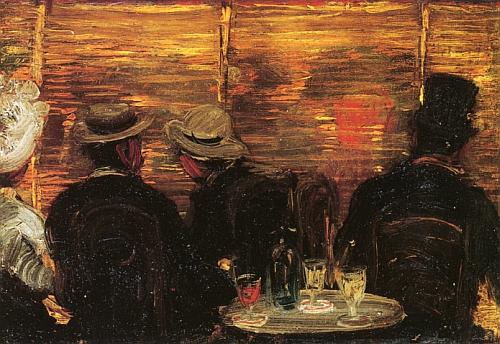
The Screen
Cafe de Versailles, Paris
George Luks
b. August 13, 1867
_______________________
from A Kind of Testament
Witold Gombrowicz
Translated by Alastair Hamilton
(....)
These pre-war years were possibly more damaging than the war itself. Suffocating under this pressure I leapt as energetically as I could towards a new understanding of man—this was the only hope. Where was I? I was in the darkest of nights, together with the whole of humanity. The old God was dying. The laws, the principles, the customs which had constituted the patrimony of humanity were suspended in space, despoiled of their authority. Man bereft of God, liberated and solitary, began to forge himself through other men . . . It was Form and nothing else which was at the basis of these convulsions. Modern man was characterized by a new attitude towards Form. How much more easily he created himself, created as he was by it!
I imagined the men of the future forming each other deliberately: a shy man will find people who make him bold; by skillfully manoeuvring others and himself, a roué will obtain a good dose of asceticism.
I added my private experience to this general view of humanity and I derived a measure of tranquility from it. I was not the only chameleon. Everybody was a chameleon. It was the new human condition, and one would have to face up to it.
I became ‘the poet of form.’
I amputated myself from myself.
I discovered man’s reality in this unreality to which he is condemned.
And Ferdydurke, instead of serving me, became a fantastic poem describing, as Schulz said, the tortures of man on a Procrustean bed, the bed of Form....(more)
Context N°20
With Shushan Avagyan, Louis Paul Boon, Céline Bourhis, Roger Boylan, Przemyslaw Czaplinski, Arkadii Dragomoshchenko, Joos Florquin, Witold Gombrowicz, Aidan Higgins, Jim Knipfel, Henry Miller, Evgeny Pavlov, Robert Pinget, Michael Pinker, Ros Schwartz, Goce Smilevski, John Taylor, Dumitru Tsepeneag, Lindsay Waters
_______________________
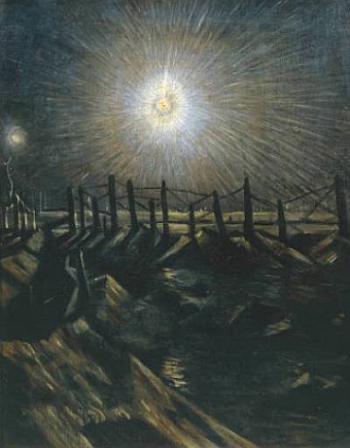
A Star Shell
Christopher Richard Wynne Nevinson
_______________________
Agnomia
Róbert Gál
transl. from the Slovak by Michaela Freeman
exquisite corpse
This is a tautology of every moment, as if every moment was necessarily a tautology.
“It seems undignified,” says Jan, “to accept congratulations for the past, as if that from the past, which is not subject to a time shortcut, was totally irrelevant. This is not a criticism of heroism, but a criticism of the need to place heroism out for adulation, as if every heroism was necessarily admirable – and not some other one. Isn’t this the conventional exchange of the act of socially defined heroism for an act of heroism which is highly individual, and thus socially undefinable? Where is the boundary between the need of a heroic act of a socially defined hero and the need of a heroic act of a hero, who is defined by this act itself into the position of a partaker of a heroic deed, who doesn’t feel the need of a social proclamation of this fact?” Jan asks. Jan is the hero of an invisible terror. Every opportunity for uprising is punished. And because each uprising gets already punished in the state of opportunity, it never runs into the acute state in any other way but wounded. A circle is always one-sided and this, always according to its direction of spinning. Multiplying its spins means, in practice, that the vision of its end naturally blends with the vision of its beginning. To push oneself off from any point of a circle is possible, however, it’s not entirely random. All we have to do is understand the rules of these banalities and by how much they help us to move forward! Because only a cynic can claim that it doesn’t matter at all which leg we get off the bed with first. To swallow the acidity of a smile with the awareness of the acidity and the smile. And so on. ...(more)
_______________________
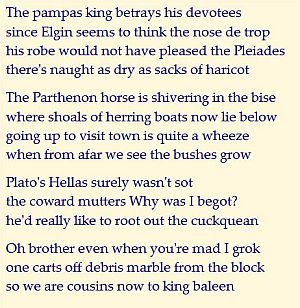
Cent mille milliards de poèmes
Raymond Queneau
randomly generated sonnets
Beverley Charles Rowe
via languagehat
_______________________
Phenomenology of a Photograph, or: How to use an Eidetic Phenomenology
L. Sebastian Purcell
Abstract
The present article aims to make good on Roland Barthe’s unfulfilled promise to provide an eidetic phenomenology for the photograph. Though the matter deserves consideration simply because no relevant account has yet been provided, the consequences of adumbrating eight eidetic features, we hope to show, bear directly on the phenomenology of time, the possibility of technological events, and the status of truth as what Heidegger called ale-theia. Finally, and most importantly for the enterprise of phenomenological reflection, if we are successful in this endeavor, we shall have established a new way to use eidetic phenomenologies: not for Husserl’s original aim of executing a rigorous science, but in a more Derridian spirit as a way to destabilize consensus.
PhaenEx
journal of existential and phenomenological theory and culture
_______________________
Magazines and newspapers are no longer putting any money into photojournalism. They will commission a portrait or two. They might send a photographer off with a writer to illustrate the writer’s story, but they no longer fund photojournalism. They no longer fund photo-reportage. They only fund photo illustration.
We should stop talking about photojournalists altogether. Apart from a few old dinosaurs whose contracts are so long and retirement so close that it’s cheaper to keep them on, there is no journalism organisation funding photographers to act as reporters. A few are kept on to help provide ‘illustration’ and decorative visual work, but there is simply no visual journalism or reportage being supported by so called news organisations.
-
Neil Burgess via Tim Atherton
_______________________
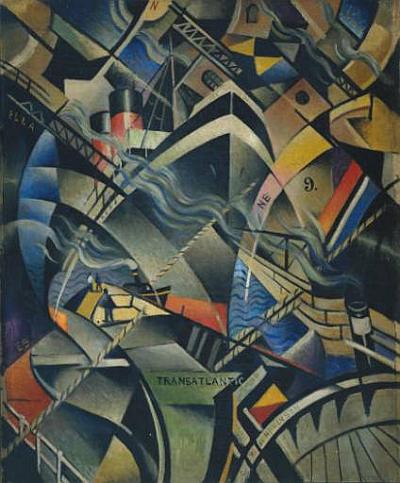
The Arrival
circa 1913
Christopher Richard Wynne Nevinson
b. August 13, 1889
_______________________
Konturen
Volume 2
Between Nature and Culture:
After the Continental-Analytic Divide
an interdisciplinary, peer-reviewed journal dedicated to the analysis of borders, framing determinations, and related figures of delimitation of all kinds: theoretical and historical, practical and speculative, aesthetic, political, methodological, and other.
via Matt Christie
_______________________
Journal for Cultural and Religious Theory
Vol. 10, no. 3
Spooky Noises:
Ghosts In The Music Machine of Paul D. Miller [pdf]
(Aka Dj Spooky)
Joshua Delpech-Ramey’s interview with DJ Spooky
Fetishized as a commodity, music is illustrative of the evolution of our entire society: deritualize a social form, repress an activity of the body, specialize its practice, sell it as a spectacle, generalize its consumption, then see to it that it is stockpiled until it loses its meaning. Today, music heralds—regardless of what the property mode of capital will be—the establishment of a society of repetition in which nothing will happen anymore. But at the same time, it heralds the emergence of a formidable subversion, one leading to a radically new organization never yet theorized, of which selfmanagement is but a distant echo. In the years since the dot-com crash, analyses of cyberculture and digital media have begun to reveal—beyond the initially hyperbolic utopianism and apocalyptic portents—both a more profound set of social potentials and a deeper set of political economic, and even spiritual ambiguities. Digital music in particular has become a flashpoint for both despair and hope: despair over the stranglehold that monopolistic capital continues to maintain over content, copyright, and royalties; hope that in music a “radically new organization” of exchange and creativity (through file sharing and collective composition) may yet be breaking through. The above quotation, which describes our current situation so well, was penned in 1977. It is from Jacques Attali’s Bruits: essai sur l’économie politique de la musique (translated in 1985 as Noise: The Political Economy of Music), a text as provocative today as it was when it first appeared.
Attali’s thesis was that music has an essential and dynamic relationship to noise, such that what can only be heard as noise in one historical moment is the harbinger of what will be heard as music in the moment forthcoming. But what Attali means by noise is at once musical and political....(more) [pdf]
_______________________
Too Poor For Measure: [pdf]
Working With Negri On Poverty And Fabulation
Daniel Colucciello Barber and Anthony Paul Smith
Journal for Cultural and Religious Theory
The classic question of the Left has been, ‘Why did the revolution not take place?’ This pessimism is lacking in the work of Antonio Negri, for whom the question is why does constituent power, the power behind every revolution in history, stagnate into the constituted power of the State, the power that reacts against further revolution? Negri’s work can be read as an attempt to answer that question, focusing on a critique of the State-form of politics, and to name a way out of stagnation and towards a productive vitality. One such name is poverty and the poor that embody it. In the course of this essay we work with the material of Negri’s conception of poverty, because it is radical in its valorization of what, from the perspective of capital, is the embodiment of weakness and lacking in potential. _______________________
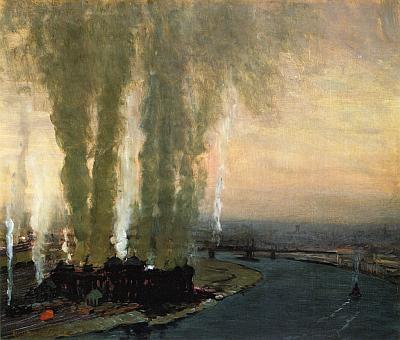
Roundhouse at High Bridge
1909-1910
George Luks
_______________________
Doom Cusp
David Meltzer
Argotist Online E-Book
In Memory of Wallace Berman
30:ix:05
Munir Bashir’s ‘ud alone
in his Baghdad studio
l987
‘Music is one
We’re all human beings
The same family
Music is for everybody’
The past that won’t
catch up to
the present
History makes itself up
until others
make it up
‘acute homesickness’
Greek: nostos
‘return home’
algos ‘pain’
Nostalgia
The retrospectives
the catalogs of old photos
of young lovelies
ME: ‘harm, oppress’
Old French, grever
‘to burden, encumber’
ME:‘hardship, hurt, sorrow’
grief/grieve
Burden of past
Weight breaks
Down early grace of
Supple unknowing
Grow to know
Death’s musk
On the cusp
...(more)
via Nick Piombino

Bookplates by Michel Fingesten
(1884 - 1943)
for Gianni Mantero
From the collection of Richard Sica.
A Journey Round My Skull
The Unkown Michel Fingesten
_______________________
Losing One's Place
Jacob Russell
the pedestal
It's always the end of the world for someone
every moment
even now as I draw this pen across the page
the last hour has come
for you, too, reading these words
your eyes follow to the end of the line
as you were taught long ago under
your teacher's eye, that circle of children
clutching copies of the same book
taking turns fingers following on the page
as you listen together
shaping the words with your lips knowing
soon it will be yours
waiting for your name
to be called
knowing yes it will come
it will happen
no wonder your mind chose rather
to drift to gaze at the clock at the door
at the window to think
of the garden behind the house
where your grandfather is planting beans
...(more)
Jacob Russell's Barking Dog
_______________________
Pedestal 58
June 21-August 21 (2010)
_______________________

Reflections on Chongqing - City of Ambition
Ferit Kuyas
Visura Magazine 10
_______________________
A happy day
Joel Lehtonen
(1881-1934)
Translated by David Barrett
Books from Finland
‘Quite the country gentleman, eh, what, hey?’ says Aapeli Muttinen the bookseller. ‘Like the poet Horace – if I may humbly make the comparison, eh, dash it? With his villa at Tusculum, or whatever the place was called, given to him by Maecenas, in the Sabine hills, wasn’t it? – dashed if I remember. Anyway, he served Maecenas, and I serve – the public, don’t I? Selling them books at fifty pence a copy.’
Muttinen’s Tusculum is his little plot of land in the country. A delightful place, comforting to contemplate when the first signs of summer are beginning to appear, after a winter spent in town in the busy pursuit of Mammon, under skies so grey that the wrinkles on Muttinen’s forehead must have doubled in number. A summer paradise of idleness…
It lies a fair distance from the town, in the region where he was born: a villa set on a hill, where the shores of Lake Saimaa break up into a labyrinth of capes and inlets. Through the leafy birches his balcony peeps out over the water.
There Aapeli is happy, especially during those first days of summer when he is still so weary and worn after his exertions in town, and once again the idea of idling in the country has all the charm of something fresh and inexhaustible.
So tiring has he found it, perched up there behind his counter, raking in his beloved money, that by springtime his poor brain is no longer capable of thoughts, or even of memories. He longs only to escape into the bosom of Mother Nature, to laze, to do no more than exist. Not as Muttinen, not as anything at all: not as a philosopher, not even as a fat pig. To be nothing, to be no kind of creature at all.
Happiness for him, as summer begins, is an absence of all thoughts and memories, an existence in the present, an indefinable peace.
The most beautiful days, the ones with the fewest thoughts and memories, are those very first days of summer: and the nights of clear golden light, enfolding him in a warm and wordless happiness....(more)
_______________________
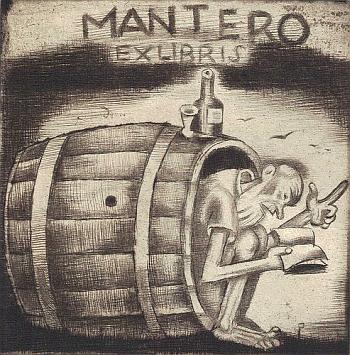
Bookplates by Michel Fingesten
_______________________
No one read the film poster.
Listen, said Underground.
No one listened. The chill rose up from the black tunnels.
Are you there? said Underground. Will you answer?
No one answered.
Are you Orpheus? said Underground.
No answer.
- Russell Hoban, Kleinzeit
An und für sich is hosting a discussion of Hoban's 1974 novel.
The Head Of Orpheus
A Russell Hoban Reference Page
_______________________
Personal Account: Being Rational
Erin Stefanidis
Each time, I would be able to evaluate things from two perspectives: my scientific logic and the explanation from the Deep Meaning. As the doctors would say, these corresponded to rationality and irrationality, respectively. But, given the input I had from the Voices (auditory hallucinations, the doctors say) and the immense feelings of truth from the Deep Meaning, I was in fact fighting to preserve my rationality in the face of the irrational. I valued my logical mind so dearly that when it began to be challenged by schizophrenic hallucinations, delusions, and disorders of the ability to ascribe meaningfulness, I used everything available to me to try and figure out what were the most rational explanations. I craved rationality, and rationality to me was taking all evidence and making conclusions. Even if they didn't conform to everyone else's ideas of what was rational, I was fighting to maintain, at the very least, the integrity of my own rationality.
Antipsychotic medication has helped to distance me from the Voices and the Deep Meaning. While I never quite give up these as irrational, I am aware that they influence my ideas of, and my actions in response to, rationality. I have come to believe that in order to truly understand others, be they schizophrenic or otherwise, we must not only discover their thoughts, feelings, and actions, but we must look to understand how they connect these into a coherent structure and to recognize that no matter what this structure looks like, it is the product of a rational mind....(more)
via Mind Hacks
_______________________
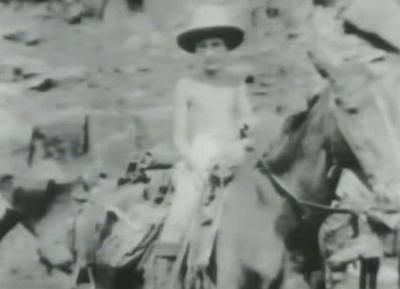 "far away and high on the mesa's crest"
Burroughs The Movie
(1985)
Featuring - Allen Ginsberg, Brion Gysin, Francis Bacon, Jackie Curtis, John Giorno, Lauren Hutton, Patti Smith, Terry Southern, William S. Burroughs
Directed By - Howard Brookner
UbuWeb: Film & Video
via The Allen Ginsberg Project

Wasted Expressions
photographs and text by
Charlie Ferguson
lens culture
_______________________
The Alchemist
I burned my life, that I might find
A passion wholly of the mind,
Thought divorced from eye and bone,
Ecstasy come to breath alone.
I broke my life, to seek relief
From the flawed light of love and grief.
With mounting beat the utter fire
Charred existence and desire.
It died low, ceased its sudden thresh.
I had found unmysterious flesh --
Not the mind's avid substance -- still
Passionate beyond the will.

Louise Bogan
b. August 11, 1897
photo - Curt Alexander
Louise Bogan at The Poetry Foundation more poems 1 2
Louise Bogan and the Pleasures of Formal Poetry
Dena L. Moore
The Veiled Mirror and the Woman Poet
Elizabeth Caroline Dodd on H.D., Louise Bogan, Elizabeth Bishop and Louise Gluck
google books
.....................................................
Zone
Louise Bogan
We have struck the regions wherein we are keel or reef.
The wind breaks over us,
And against high sharp angles almost splits into words,
And these are of fear or grief.
Like a ship, we have struck expected latitudes
Of the universe, in March.
Through one short segment’s arch
Of the zodiac’s round
We pass,
Thinking: Now we hear
What we heard last year,
And bear the wind’s rude touch
And its ugly sound
Equally with so much
We have learned how to bear.
_______________________
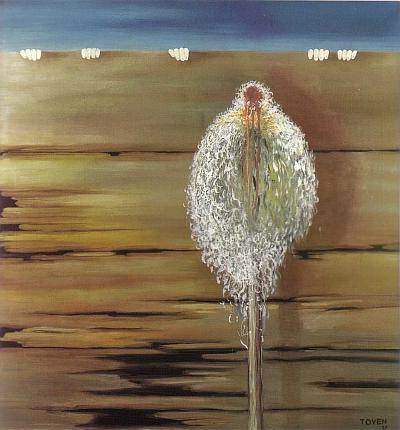
Horror
1937
Toyen
Maria Cerminova
1902 - 1980
Weimar
Art and Modernity in Central Europe
1 2
_______________________
from A Farewell to English
Michael Hartnett
for Brendan Kennelly
1
Her eyes were coins of porter and her West
Limerick voice talked velvet in the house:
her hair was black as the glossy fireplace
wearing with grace her Sunday-night-dance best.
She cut the froth from glasses with knife
and hammered golden whiskies on the bar
and her mountainy body tripped the gentle
mechanism of verse: the minute interlock
of word and word began, the rhythm formed.
I sunk my hands into tradition
sifting the centuries for words. This quiet
excitement was not new: emotion challenged me
to make it sayable. This cliché came
at first, like matchsticks snapping from the world
of work: mánla, séimh, dubhfholtach, álainn, caoin:
they came like grey slabs of slate breaking from
an ancient quarry, mánla, séimh, dubhfholtach,
álainn, caoin, slowly vaulting down the dark
unused escarpments, mánla, séimh, dubhfholtach,
álainn, caoin, crashing on the cogs, splinters
like axeheads damaging the wheels, clogging
the intricate machine, mánla, séimh,
dubhfholtach, álainn, caoin. Then Pegasus
pulled up, the girth broke and I was flung back
on the gravel of Anglo-Saxon.
What was I doing with these foreign words?
I, the polisher of the complex clause,
wizard of grasses and warlock of birds,
midnight-oiled in the metric laws?
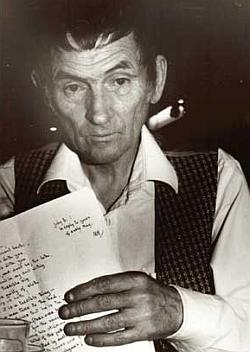
Michael Hartnett
Michael Hartnett at Poetry International Web
Michael Hartnett in
Contemporary Irish poetry: an anthology
edited by Anthony Bradley
'He'll to the Moors', Michael Hartnett
Paul Durcan
Irish University Review: a journal of Irish Studies, Autumn-Winter, 2009
You're Not the Outlaw You Think You Are
Remembering Michael Hartnett
Conor O'Callaghan
_______________________
From Mozart Variations
Göran Sonnevi
Translated from the Swedish by John Matthias
(Surviving Lines of an Unfinished Translation
Made
with Göran Printz-Påhlson, 1984-1986)
*
Mozart and the whiteness of morning
*
a face which has cut off, white
as a physical pain
close to the unendurable—
*
Inscrutable humankind, violent
listen to the sounds
the silence grows inside me, a huge cone
a funnel
sucking me up into space
so it was
when I had the entire world
growing in my belly, the globe
just grew and grew, and I rose and rose
a tiny shape
on the infinite surface
shouted, cried
from there, to you, out of my mouth
came letter-sculpted blocks
of silence
...(more)
Ars Interpres
Issue: 8-9
From the Labyrinth
(September 2007)
thanks to the page
edited by John McAuliffe and Vincenz Serrano
_______________________
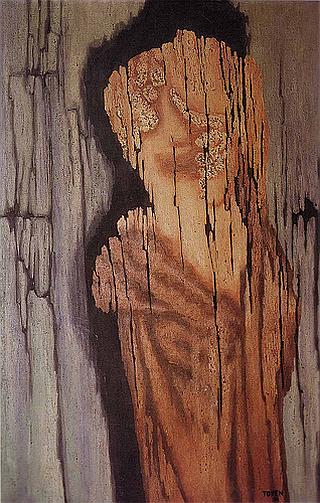
Rose Ghost
Toyen
1934
calypsospots
flickr
_______________________
Evening in the Sanitarium
Louise Bogan
The free evening fades, outside the windows fastened with decorative iron grilles.
The lamps are lighted; the shades drawn; the nurses are watching a little.
It is the hour of the complicated knitting on the safe bone needles; of the games of anagrams and bridge;
The deadly game of chess; the book held up like a mask.
The period of the wildest weeping, the fiercest delusion, is over.
The women rest their tired half-healed hearts; they are almost well.
Some of them will stay almost well always: the blunt-faced woman whose thinking dissolved
Under academic discipline; the manic-depressive girl
Now leveling off; one paranoiac afflicted with jealousy.
Another with persecution. Some alleviation has been possible.
O fortunate bride, who never again will become elated after childbirth!
O lucky older wife, who has been cured of feeling unwanted!
To the suburban railway station you will return, return,
To meet forever Jim home on the 5:35.
You will be again as normal and selfish and heartless as anybody else.
There is life left: the piano says it with its octave smile.
The soft carpets pad the thump and splinter of the suicide to be.
Everything will be splendid: the grandmother will not drink habitually.
The fruit salad will bloom on the plate like a bouquet
And the garden produce the blue-ribbon aquilegia.
_______________________
Thinking About Louise Bogan
Kathleen Norris
agni
Sitting here
alone with Orion—
a lesson, the woman said,
in drawing a straight line—
I’m home.
This is what I fought for,
to draw from the darkness
as from a well.
I endured, she said,
without the gift of faith
and made what I needed
out of work and love
and stolen time.
I kept at the writing,
refusing the sacred bowl of broth
they held out for me:
the dressed-up Sundays,
china never used
kept under glass
and dusted each week.
...(more)

The Horse from the Sea
Night Hallucinations
Illustrations by Jaroslav Šerých
for Tales of the Uncanny
A Journey Round My Skull
1 2
_______________________
Journals - July 1959
John Wieners
What can I write about
to set my heart afire
as the wood cut and burning
in the stone place on my left.
Here are no demons, only friends.
Does the poem proceed out of pain
does the heart have to beat at a super
and unnatural speed for the word
to be produced, like the gold
of alchemy,
transmuted.
There are no dreams
I have not lived except for
Out the window West and
the set sun.
In the window a kerosene lamp
whose light I write by.
To my left the fire in the stone place
and 4 people before it,
the woman, her daughter and 2 men,
sit on the stone floor, talking of sun
worship and fire worship,
the cricket
in the roof where the bats live,
Still shows a lighter blue than the black
corners of this room,
stone house with wooden
doors
on the side of a ridge that rises behind
the house to a hill
...(more)
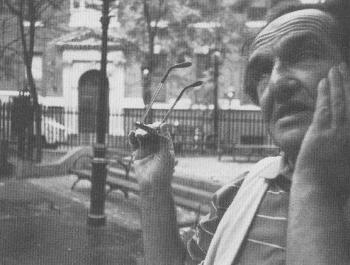
John Wieners
1934 - 2002
a new page at EPC
The Hipster of Joy Street
An introduction to the life and work of John Wieners
Pamela Petro _______________________

Harbour, Berwickshire
Sea Change
Michael Marten
_______________________
the terrible community of financial capitalism
tobias c. van Veen
(....)The financial community crossed over into illegality. Hell, it bought and sold the legal system. It understands full well every ounce of Tiqqun’s phrase that “all sado-masochistic exchanges outside of commodity relations are devoted in the end to illegality.” Indeed, the financial community long exceeded the mere trading of goods, or even that commodity relations – whether it be that of the signifier itself, of money, or of bodies, or of resources, products, processes or objects in general – should determine the basis of trade negotiations, future assessments, currencies, stock prices or debt obligations. The financial community reified, beyond the paradigm of legality, the profiteering of sado-masochistic force itself. When buying and selling against the probable failure of toxic assets, in such a way that utterly erases all ties to any kind of commodity relation, then the financial community trades in nothing but sado-masochistic violence wrought through the power of mystic numerosity. Credit and debit are concepts applied through the distribution of financial “justice” – the simple equation where debt is judgement, bankruptcy, death. The financial community disregards with sheer contempt the consequences of capitalizing the very human relations outside of commodity relations – where thousands of Blooms would be forced to foreclose and enter into bankruptcy – and their sacrifice is to workship the most pure, abstract illegality, the unleashed violence of abstract Moloch. Or so it thinks....(more)
Theses On The Terrible Community
Tiqqun
_______________________
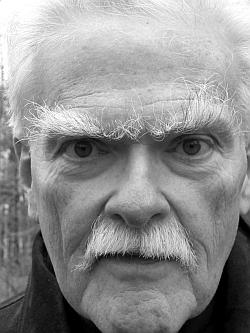
Robert Kelly
photo by Charlotte Mandell
“A word comes to mind. I write it down and see what happens. When you do this every day for 50 years, you learn how to wait.”
- Robert Kelly
The Logic of the World: An Interview with Robert Kelly
Sudden fiction. In my first answer I spoke of the immateriality of size, and the immense size of effect.So sudden fiction happens quickly, and swings a very long tail. Sudden fiction meant for me something that uses the conventions of prose fiction with the mindset of poetry. Not prose poem, as the French invented it and we have done so much with. But fiction, story, turned with the rapt condensation of a poem. Sudden fiction has been there—rare moments of it—for a long time. Those abrupt and awe-struck chapters in Melville’s Billy Budd, that amazing story by Georg Heym from a hundred years ago, “The Autopsy,” the dozens of parables and “fragments” by Kafka—those are some of the jewel-like ancestors of what we try to do....(more)
The Logic of the World and Other FictionsRobert Kelly amazon link
_______________________
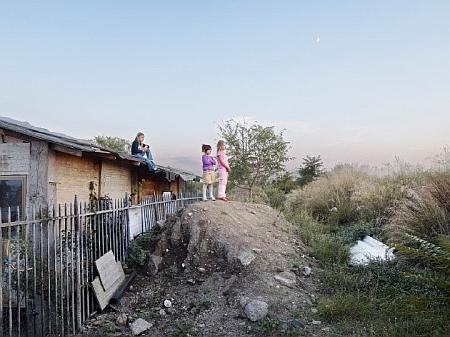
Casilino 900
Alessandro Imbriaco
via Joerg Colberg
_______________________
Hanging A Hammock Between Death And The Abyss:
A Götterdämmerung Of Kitsch
Phil Rockstroh
Ebullient Skepticism
(....)
For many years now, we have been witness to cultural fantasies(both of the religious and secular variety) of decline, decay, of even the end of civilization itself … that are, perhaps, a collective wish for the taut bindings that modernity places on the psyche to be loosened. The modernist towers must fall; then our insular, nature-denuded mode of mind will be pulled down from its lofty precincts into the élan vital of primal dirt … There, the sterility of the collective, corporatized mind will meet its end, and reborn passion and vital imaginings will bloom like wild flowers in a post-apocalyptic strip mall parking lot … This is what, I suspect, lies beneath our fascination with apocalyptic scenarios. In these contemporary deluge myths, the hyper-commercialized and commodified psyche, befogged by its own convoluted libido, once destroyed, is now free to start life anew.
Concurrently, in the fundamentalist Christian imagination, narratives of consumerism and End Time Mythology interweave and meld, becoming a gospel of instant gratification and imminent destruction … This is a religious cosmology resonating from a junk food paradigm: The Gospels of The Drive Thru Jesus; when The Rapture comes, our corporeal bodies will be cast aside like fast food wrappers.
But be warned, by eating of all that high caloric food, all of you Jesus-hungry Lard Asses of The Lord: If your clothes were to fall from you (as your prophecies claim) as you rise skyward, the sight of all your fat, sagging bodies, floating in air, will resemble anything but the dawning of eternal paradise — instead the event will more likely resemble an endless tape loop of a porno video for fat fetishists shot in a zero gravity chamber.
The narrative of fundamentalist Christianity has become so encumbered with kitsch imagery that its followers hope for the destruction of the planet itself so that they can escape the soul-defying imprisonment of its creepy dogma.
Hence, the modernist conundrum is: how does one retain the depth and resonance of myth, without concretizing it into a pernicious, fundamentalist death cult? Judaism, Christianity, Islam — the myths of the jealous, desert god — present a problem, because they place the answer in heaven i.e., far away in a sterile paradise … The gods of the earth have been cast-out as sinful. Hence, those religions become so obsessed with a fantasy of purity that earth-dwelling and subterranean drives and desires — that were symbolized, for example, by the Greeks as the gods Hermes, Pan, and Hades — appear to Christian believers as Satanic.
In other words, Christians, Jews and Muslims, with their gaze fixed on heaven, view their earthly, human half as demonic. Moreover, by becoming split-off from their human half, followers of monotheistic belief systems are prone to suffer all the ills they attribute to the devil. Satan does have a “wide stance” after all....(more)
_______________________

Jones Falls locks
Rideau Canal
Jessica Auer
_______________________
Lucky’s Monologue from Waiting for Godot
Given the existence as uttered forth in the public works of Puncher and Wattmann of a personal God quaquaquaqua with white beard quaquaquaqua outside time without extension who from the heights of divine apathia divine athambia divine aphasia loves us dearly with some exceptions for reasons unknown but time will tell and suffers like the divine Miranda with those who for reasons unknown but time will tell are plunged in torment plunged in fire whose fire flames if that continues and who can doubt it will fire the firmament that is to say blast heaven to hell so blue still and calm so calm with a calm which even though intermittent is better than nothing but not so fast and considering what is more that as a result of the labours left unfinished crowned by the Acacacacademy of Anthropopopometry of Essy-in-Possy of Testew and Cunard it is established beyond all doubt all other doubt than that which clings to the labours of men that as a result of the labours unfinished of Testew and Cunard it is established as hereinafter but not so fast for reasons unknown that as a result of the public works of Puncher and Wattmann it is established beyond all doubt that in view of the labours of Fartov and Belcher left unfinished for reasons unknown of Testew and Cunard left unfinished it is established what many deny that man in Possy of Testew and Cunard that man in Essy that man in short that man in brief in spite of the strides of alimentation and defecation is seen to waste and pine waste and pine and concurrently simultaneously what is more for reasons unknown in spite of the strides of physical culture the practice of sports such as tennis football running cycling swimming flying floating riding gliding conating camogie skating tennis of all kinds dying flying sports of all sorts autumn summer winter winter tennis of all kinds hockey of all sorts penicilline and succedanea in a word I resume and concurrently simultaneously for reasons unknown to shrink and dwindle in spite of the tennis I resume flying gliding golf over nine and eighteen holes tennis of all sorts in a word for reasons unknown in Feckham Peckham Fulham Clapham namely concurrently simultaneously what is more for reasons unknown but time will tell to shrink and dwindle I resume Fulham Clapham in a word the dead loss per head since the death of Bishop Berkeley being to the tune of one inch four ounce per head approximately by and large more or less to the nearest decimal good measure round figures stark naked in the stockinged feet in Connemara in a word for reasons unknown no matter what matter the facts are there and considering what is more much more grave that in the light of the labours lost of Steinweg and Peterman it appears what is more much more grave that in the light the light the light of the labours lost of Steinweg and Peterman that in the plains in the mountains by the seas by the rivers running water running fire the air is the same and than the earth namely the air and then the earth in the great cold the great dark the air and the earth abode of stones in the great cold alas alas in the year of their Lord six hundred and something the air the earth the sea the earth abode of stones in the great deeps the great cold on sea on land and in the air I resume for reasons unknown in spite of the tennis the facts are there but time will tell I resume alas alas on on in short in fine on on abode of stones who can doubt it I resume but not so fast I resume the skull to shrink and waste and concurrently simultaneously what is more for reasons unknown in spite of the tennis on on the beard the flames the tears the stones so blue so calm alas alas on on the skull the skull the skull the skull in Connemara in spite of the tennis the labours abandoned left unfinished graver still abode of stones in a word I resume alas alas abandoned unfinished the skull the skull in Connemara in spite of the tennis the skull alas the stones Cunard (mêlée, final vociferations) tennis... the stones... so calm... Cunard... unfinished...
thanks to Follow Me Here
Is Lucky’s Monologue Poetry?The Prose Poem: An International Journal

Excited People
1913
Emil Nolde
b. August 7, 1867 141 images
_______________________
The Quiet Coup
Simon Johnson
atlantic 2009
... inevitably, emerging-market oligarchs get carried away; they waste money and build massive business empires on a mountain of debt. Local banks, sometimes pressured by the government, become too willing to extend credit to the elite and to those who depend on them. Overborrowing always ends badly, whether for an individual, a company, or a country. Sooner or later, credit conditions become tighter and no one will lend you money on anything close to affordable terms.
The downward spiral that follows is remarkably steep. Enormous companies teeter on the brink of default, and the local banks that have lent to them collapse. Yesterday’s “public-private partnerships” are relabeled “crony capitalism.” With credit unavailable, economic paralysis ensues, and conditions just get worse and worse. The government is forced to draw down its foreign-currency reserves to pay for imports, service debt, and cover private losses. But these reserves will eventually run out. If the country cannot right itself before that happens, it will default on its sovereign debt and become an economic pariah. The government, in its race to stop the bleeding, will typically need to wipe out some of the national champions—now hemorrhaging cash—and usually restructure a banking system that’s gone badly out of balance. It will, in other words, need to squeeze at least some of its oligarchs.
Squeezing the oligarchs, though, is seldom the strategy of choice among emerging-market governments. Quite the contrary: at the outset of the crisis, the oligarchs are usually among the first to get extra help from the government, such as preferential access to foreign currency, or maybe a nice tax break, or—here’s a classic Kremlin bailout technique—the assumption of private debt obligations by the government. Under duress, generosity toward old friends takes many innovative forms. Meanwhile, needing to squeeze someone, most emerging-market governments look first to ordinary working folk—at least until the riots grow too large. ...(more)
.....................................................
Does anyone doubt that once a society ceases to be able to afford schools, public transit, paved roads, libraries and street lights -- or once it chooses not to be able to afford those things in pursuit of imperial priorities and the maintenance of a vast Surveillance and National Security State -- that a very serious problem has arisen, that things have gone seriously awry, that imperial collapse, by definition, is an imminent inevitability?
- Glenn Greenwald
_______________________
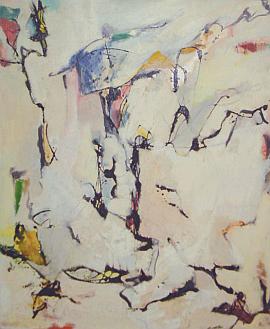
Albert Kotin
b. August 7, 1907
_______________________
More on Non-Western Philosophy (the Very Idea)
Justin E. H. Smith
I strongly suspect that philosophers are unable to accept such a conceptual shift in the way they think of the Western philosophical tradition relative to the 'Restern' traditions because they are still implicitly attached to a quasi-Hegelian conception of philosophy as the unfolding of the European Spirit. But until they do accept this shift, it will remain entirely unclear why they act as though they are happy to see African philosophy gaining increasing representation in the discipline. Now to my mind we should be studying the history of Western philosophy in no way differently than we might approach Yoruba cosmology (and this is in large part because I think that writing is only a prosthesis to thought, and not the confirmation of the specialness or particular profundity of a literate society's style of thinking), but I believe there is a serious problem when we set out from an implicit definition of 'philosophy' according to the cultural and historical peculiarities of the European tradition, and then try to see if we can find anything in other parts of the world that approximates to this tradition. I can in fact think of nothing better for philosophers to do than to undertake a comprehensive comparative study of the different ways different peoples carve up the world, but this is a far cry from what we are doing when we permit philosophy to remain Western by default, while indulging here and there in the token representation of negatively defined 'non-Western' traditions....(more)
_______________________
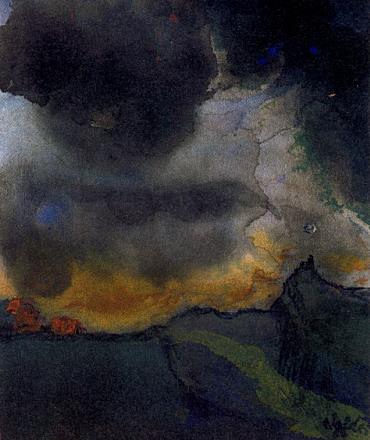
Mountain Landscape
Emil Nolde
_______________________
Under My Thumb (Passivity 3)
Lauren Berlant
. . . . . . . Supervalent Thought
I am continuing here the discussion of passivity’s promiscuity of form introduced in the last few posts.
There are threads in the ordinary that scroll out as uninteresting times, the times that don’t count and go uncounted and unaccounted for: a killer stabs 67 times but remembers only 2, when we mince garlic we remember a field of action and not how many rocks of the blade, I am at my desk innumerable hours doing what since just the letter P dropped out and got to stay, and there are no consequences to those states that exercise the range of emotions one has, states that are folded so deeply into the activity of being sentient that they dissolve the distinction between what’s mental, enacted, and encountered. In having a drink, taking a nap, going for a run, surfing, spacing, fuming, talking, one is exposed to the uncanny danger of who one is, and it is these aleatoric, roll of the dice states that often host what falls under the radar when someone asks you how your day was, if you’re lucky enough to have anyone around curious enough about you to ask.
I learned the importance of exercising my short term affective memory at Twin Oaks. It was a utopian discipline to remember what never was an event. At the end of the day we would all find someone to tell the day to, and to listen to. Sometimes one would have sex with the person one had found to engage events with, because just one liked them so much for the lightness and patience of the exchange; sometimes it closed with a hug, or a mock ritual bow. You didn’t have to know the person you found, it was a ritual like the other cleansing closures before bed. It helped to seal things off to try to remember what happened, and it was always shocking to witness in one’s own story how much had already virtually passed from memory, leaving the affective traces unmoored from their origins, like stains of a certain transparency and age....(more)
Passivity 1 and 2_______________________
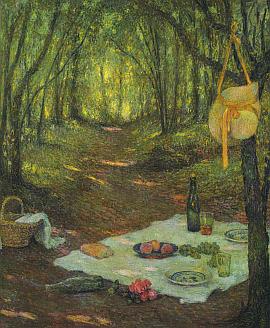
Lunch in the Woods
Gerberoy
Henri Le Sidaner
b. August 7, 1862
_______________________
Pierre Reverdy
translated by Tom Hibbard
milk
SECRET
The empty bell
The dead birds
In the house where everything sleeps
Nine hours
The world stands still
It seems someone has died
The trees look as though they are smiling
A drop of water hangs at the end of each leaf
A cloud crosses the night
Outside a door a man sings
The window opens without a sound
_______________________
Rethinking E.E. Cummings: An Appeal for a New Reading (Part One)
Jerome Rothenberg
Every time I prepare a new anthology or go over the writings of the twentieth century from the perspective of the present, I wonder where (and how) it was that we lost E. E. Cummings. In my own coming into poetry at all – but that was long ago – his was a central presence. I knew his poems, could recite a good number of them by (almost) heart, was on to all of his tricks, had Cummings lines and phrases (always) at my fingertips, and found his voice entwined with mine in writing. If my own punctuation or upper cases fell away it was with reference to him; if my margins trembled, turned to rags, it was with his as early model; if my adverbs shifted into verbs or my conjunctions turned to nouns, it was clearly him behind it. At sixteen I had no other guides but him and Stein (and shortly Joyce) into new ways of language. By a decade later, the works of others lingered or came newly into mind, but Cummings (for all intents and purposes) had disappeared.
It baffles me – not only because his poems still resonate for me (and I have always been careful to include him in the assemblages, the gatherings I’ve made) but because one would have expected him to hold for the generations of latterday modernist (later called postmodernist) poets. Think back to the roots of my own generation. In his great initiatory essay, “Projective Verse” (that was in 1950) Charles Olson presented not only a new way to make the poem but found that there existed older (American) poets who had already (“each after his way”) moved in that direction, who had established (he wrote of them) “the already projective nature of verse.” From that identifying statement, to which I was already late in coming, the two poets who come inevitably to mind are Ezra Pound and William Carlos Williams, and yet, when Olson comes to name them, it is a third one – Cummings – whom he mentions and credits first....(more)
( Part Two)
_______________________
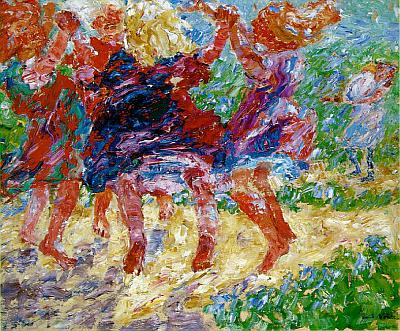
Wildly Dancing Children
Emil Nolde
1909
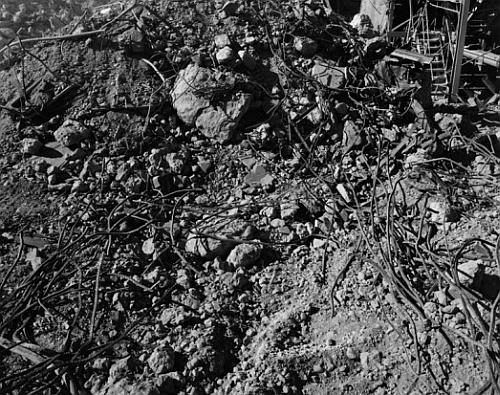
Geography of Scars
William Wylie
via John Latta
_______________________
Prose
Thomas Bernhard
Translated by Martin Chalmers
Reviewed by Stephen Sparks
Three Percent
But the truth is that I want to go mad, I want to go mad, nothing I want more, than really go mad, but I fear that I am far from being able to go mad. I at last want to go mad! I don’t want to be only afraid of going mad, I at last want to go mad. Two doctors, one of whom is a highly scientific doctor, have prophesied that I shall go mad, very soon I would go mad, the two doctors prophesied, very soon, very soon; now I’ve been waiting two years for it to happen, to go mad, but I still haven’t gone mad.
- Thomas Bernhard, "The Cap"
This breathless, hysterical desire is merely another form of madness and bars the way to any escape. This is the fate of Bernhard’s characters: a crazed desire for insanity or suicide, both options being viewed as an end to suffering. To go on living is possible, of course, but always with the awareness that “We are at liberty to kill ourselves.”
A friend and I, both booksellers, were recently discussing a curious compulsion we feel when recommending “depressing” books: we find that we search, almost unconsciously, to find something palatable on which to focus our enthusiasm. This is natural enough in sales, I suppose, but nonetheless troubling. In the case of Bernhard, for instance, I find myself explaining that while his work is, well, almost unbearably grim, there’s comedy and pathos in it as well. This is true—Bernhard is a savagely hysterical writer—but highlighting it obscures a fundamental characteristic of his, and many of our best writers’, work: the acknowledgement that life is itself not particularly palatable. This isn’t to say life, and by extension superior works of art, aren’t graced by moments of remarkable beauty, but by focusing only on the “nice” we risk shutting ourselves off from the fullness of experience.
Bernhard offers us such a discomforting vision. In the story “Is it a Comedy? Is it a Tragedy?” his narrator offers an opinion that “one describes best what one hates.” Our literature is much richer for this assumption....(more)
_______________________
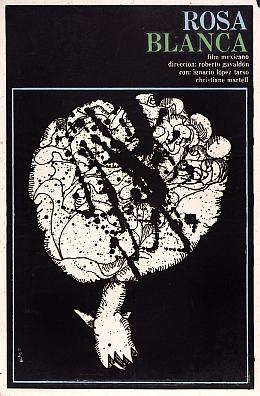
Rosa Blanca
1975
Cuban Film Posters
Eduardo Muñoz Bachs
(1937 - 2001)
A Journey Round My Skull
_______________________
My Life in Therapy
Daphne Merkin
New York Times Magazine
(....)
To this day, I’m not sure that I am in possession of substantially greater self-knowledge than someone who has never been inside a therapist’s office. What I do know, aside from the fact that the unconscious plays strange tricks and that the past stalks the present in ways we can’t begin to imagine, is a certain language, a certain style of thinking that, in its capacity for reframing your life story, becomes — how should I put this? — addictive. Projection. Repression. Acting out. Defenses. Secondary compensation. Transference. Even in these quick-fix, medicated times, when people are more likely to look to Wellbutrin and life coaches than to the mystique-surrounded, intangible promise of psychoanalysis, these words speak to me with all the charged power of poetry, scattering light into opaque depths, interpreting that which lies beneath awareness. Whether they do so rightly or wrongly is almost beside the point. ...(more)via Follow Me Here...
_______________________
Four Walls
A psychiatrist’s view of poetry and poets.
Iain McGilchrist
_______________________
 Day Dreams
Howard Hodgkin
b. August 6, 1932
_______________________
The last-gasp, end-of-millennium starting point of Coma, and of Guyotat's act of memory, backwards in time to the period of his physical and linguistic disintegration, is sparked by that mysterious vision of identicality. The itinerant writer who, in his dereliction, appears to be Guyotat, but is simultaneously not him, causes his memory to move through the scandals and legends unleashed by his own distinctive past history, thereby unpeeling him from that mirror image, so that the book is now able to begin.
Coma: The Art of Unconsciousness
Stephen Barber reviews Pierre Guyotat's Comamute
Pierre Guyotat's Coma is a book of fragments that, in their amassing and accumulation, recount a narrative of simultaneous corporeal and linguistic disintegration and emaciation, in the form of a journey of hallucinations and travels undertaken through France, that leads towards a dead end: a near-fatal physical coma, and a terminal breakdown of language - which, through a further aberration (one of many to be experienced in Guyotat's work), eventually transmutates into the form of a book of resuscitation, and into a new language: Coma....(more)
Muteculture and politics after the net
Vol 2 #16
In this issue of Mute we look at the systemic requirement to appear, to have an identity, to become intelligible - as an individual, a face, a body, a set of affects, a data-set within biopolitical capitalism. This recurrent demand to appear is both extracted and seduced out of us by the apparatuses of state and spectacle, the system of property and images, the simultaneous need to harness labour and manage the unemployed. In this issue we also look at the deeper shifts in capitalism which trigger the intensifying management of life; a crisis of abundance is brought on by industrial and technological developments converting the majority of the earth's inhabitants into a ‘surplus' population to be managed and ‘warehoused' in jails, workfare schemes or that open prison known as Web 2.0.
_______________________

Kyoto
Naoko Matsubara
via Steve Himmer
_______________________
Radical Atheism: Derrida and the Time of Life
Martin Hagglund
mediafire pdf - via aaaaarg
I never stop analyzing the phenomenon of “survival” as the structure of surviving, it is really the only thing that interests me, but precisely insofar as I do not believe that one lives on post mortem. And at bottom it is what commands everything—what I do, what I am, what I write, what I say.
-
Derrida, A Taste for the Secret
In the preceding chapters I have demonstrated how Derrida’s work offers powerful resources to think life as survival and the desire for life as a desire for survival. I have argued that every moment of life is a matter of survival because it depends on what Derrida calls the structure of the trace. The structure of the trace follows from the constitutive division of time. Given that every moment of life passes away as soon as it comes to be, it must be inscribed as a trace in order to be at all. The tracing of time enables the past to be retained and thus to resist death in a movement of survival. However, the survival of the trace that makes life possible must be left for a future that may erase it. The movement of survival protects life, but it also exposes life to death, since every trace is absolutely destructible. I have argued that such radical finitude is not a lack of being that it is desirable to overcome. Rather, the finitude of survival opens the possibility of everything we desire and the peril of everything we fear. The affirmation of survival is thus not a value in itself; it is rather the unconditional condition for all values. Whatever one may posit as a value, one has to affirm the time of survival, since without the time of survival the value could never live on and be posited as a value in the first place.
In this final chapter I want to elaborate how the unconditional affirmation of survival allows us to rethink the condition of political responsibility and especially the desire that drives political struggle. I will argue that the radical finitude of survival is not something that inhibits responsibility and political struggle; it is rather what gives rise to them. If we were not exposed to the coming of a future that could violate and erase us, there would be nothing to take responsibility for, since nothing could happen to us. It is thus the finitude of survival—and the affirmation of such survival—that raises the demand of responsibility. If I did not desire the survival of someone or something, there would be nothing that precipitated me to take action. Even if I sacrifice my own life for another, this act is still motivated by the desire for survival, since I would not do anything for the other if I did not desire the survival of him or her or it.
_______________________
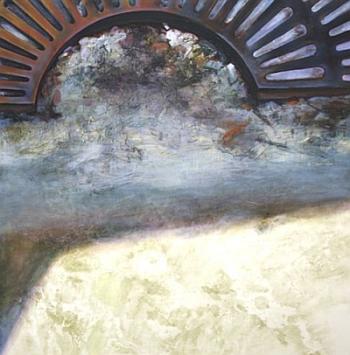
treeless
Lana Waldrep
Page Bond Gallery
Lana Waldrep
_______________________
There are (obviously) no comment boxes here at Isola di Rifiuti. I write publicly in order to write, to work out a daily regimen of attending to things (weather, scents, the odd verbal-succors of my mopishness, &c.), to make a record of what reading I do. I am hardly a social person. (The social bedlam of the networking gizmos registers naught here. I doubt that twit’d zingers and / or a marketeer’s gabble of one-upmanship a literature makes. I defriend’d my own smart-alecky self long ago.) My sense of audience is inchoate, larval, unsustain’d, shifting. I argue with what seems arguable or reprehensible (and I fully expect any counter-arguments’ll find a place without my assistance). I praise what pleases me. I am convinced that that “highly suspect activity” (Ashbery call’d it) of amusing oneself is, again, in terribly short supply, or, (as they say) “no longer valorized.” So it goes.
- John Latta
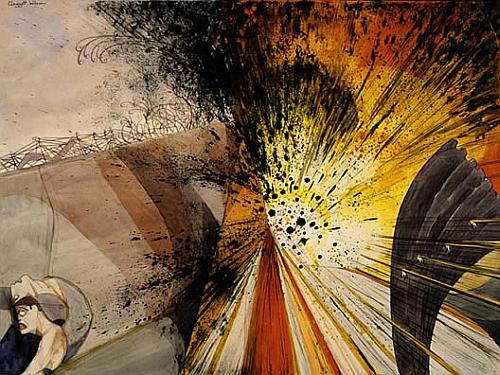 Flower of Death
Not as it Looks, But as it Feels, Sounds and Smells
Claggett Wilson
1887 - 1952
1 2
via Ordinary finds
_______________________
In Stove Polish, On Paper Grabbed From a Burning Mansion
Horrors Of The Avantgarde: Twenty Years Ago In The Corpse
Andy Robbins
Exquisite Corpse
(....)
2
If crude inhabits the eye, surely sickness will follow the gaze that looking can transport to August even the vast meatlocker of the upper Midwest, fard up the superface, cry on the table at which our daughters sit in bright, hungry dresses, the look that is hitched as always to the insane proposal that the taste will always emerge which confirms any course.
3
Our carburettori promulgate measures that seem natural because we suffer them as inexorabilities and Harmony is wreck’t. Horror is married to our Grief, deformity added to Pleasure. And we seem to have a touch for nothing but ourselves, uncommon, who have begun to speak for the ludicrous spectacle of trying to speak in a way that will make all other speech gloss, while, post-compression, in acceleration, allusion to community is lost, while by tongue we continue to disintegrate, giving off an attractive local heat, a faint blue flickering light. It pulses in a morose code: WHO ARE WE?
_______________________
For the Unknown Enemy
William Stafford
This monument is for the unknown
good in our enemies. Like a picture
their life began to appear: they
gathered at home in the evening
and sang. Above their fields they saw
a new sky. A holiday came
and they carried the baby to the park
for a party. Sunlight surrounded them.
Here we glimpse what our minds long turned
away from. The great mutual
blindness darkened that sunlight in the park,
and the sky that was new, and the holidays.
This monument says that one afternoon
we stood here letting a part of our minds
escape. They came back, but different.
Enemy: one day we glimpsed your life.
This monument is for you.
courtesy of Philip Metres, Behind the Lines: Poetry, War, & Peacemaking
_______________________
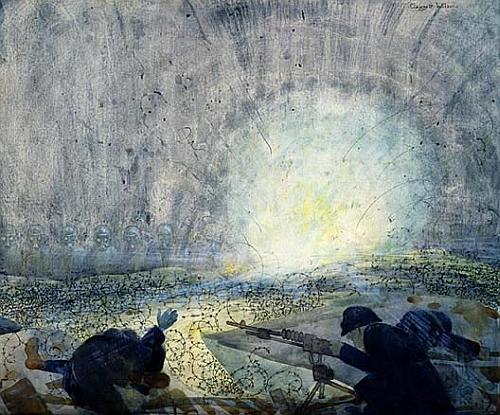 Symphony of Terror
Claggett Wilson
_______________________
There is no harmony in the universe. We have to get used to this idea that there is no real harmony as we have conceived it. But, when I say this, I say this in all admiration for the jungle. It is not that I hate it. I love it, I love it very much. But I love it against my better judgement.
- Werner Herzog
_______________________
Sending: On Representation
Jacques Derrida
translated by Peter and Mary Ann Caws
Social Research, 49:2
mediafire pdf - via aaaaarg
Imagine that French were a dead language.
I could just as well have said: Represent that to yourselves, French, a dead language.
And in some archive of paper or stone, on some roll of microfilm, we could read a sentence. I read it here, let it be the opoening sentence of this introductory address, for example this: "One might say that we represent something (nous sommes en représentation).
Are we sure we know what this means, today? Let us not be too quick to believe it. _______________________

Arques-la-Bataille
John Twachtman
b. August 4, 1853
_______________________
There are important lessons to be learned from the examples of Levi, Terkel and Røgilds. The first relates to politics. Our political debates do not suffer from too much doubt but from too much certainty. The task of thinking is to live with doubt in the service of understanding, rather than living with certainty in the preservation of ignorance.
The listenersLes Back eurozine
"You do not interest me. No man can say these words to another without committing a cruelty and offending against justice," writes philosopher Simone Weil. To turn a deaf ear is an offence not only to the ignored person but also to thinking, justice and ethics. Coleridge's Ancient Mariner is cursed because no one will listen to his story. The Italian chemist-turned-writer Primo Levi was preoccupied with this fable because of his fear that on returning from Auschwitz people like him would be either ignored or simply disbelieved. Regardless, listening gets a very mixed press amongst critics and intellectuals. There is a suspicion of "wistful optimism" or the quasi-religious appeal to "hold hands" and play priest at the confessional. These qualms miss the centrality of listening to a radical humanism which recognises that dialogue is not merely about consensus or agreement but engagement and criticism. This is something that Primo Levi understood....(more)
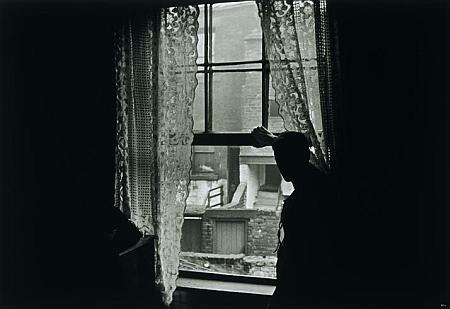
Gisèle Freund
1908 (12) - 2000
1 2
_______________________
My heart rouses
thinking to bring you news
of something
that concerns you
and concerns many men. Look at
what passes for the new.
You will not find it there but in
despised poems.
It is difficult
to get the news from poems
yet men die miserably every day
for lack
of what is found there.
Hear me out
for I too am concerned
and every man
who wants to die at peace in his bed
besides.
William Carlos Williams - from "Asphodel, That Greeny Flower"
.....................................................
Blockbuster Poem Fridays
10-week series
The Tyee
A Creation Song
Max Middle
Before night absorbs the last shades of day into its cloak
and feet begin to chatter across a known typography of clocks and brown air,
the first airy morning of a new universe dawns
with the mouth of darkness disgorging its pigment on a scintillant cosmos.
The earliest stroke of daylight smells of chaos; rivulets of sap break the ground.
And loosed from the marrow of night, an egg adrift chaos is ablaze:
light separates from dark, sun begins its journey across the sky.
The aether is a door invisible in darkness.
The hand on the door is first sanguine,
then it slams scintillant S fits doorways.
Or, S sense shiitake blam palo alto pall tree lap thud.
Out of E there, poultry flutter of wings,
lacking all, all that a flaccid ant eater could.
Flopsicle easer kicks the keeper's shackles, picks a pal
eager as straphic, traffic stalled as afferestic,
analeptic to a papa point of paratchik paparazzi,
loftitude, a stratospheric let down into a slide of
laughed a lot when lancelot's allotted lands doubled.
Hopscotch to take on a chance leashing it to fermentation.
Alone best left on a pot to boil out the trouble.
An hour steamed soft tall ships afloat left ticking
aloud on clouds, salt crumbs and balloons.
...(more)
Max Middle is the artistic director of The A B Series: Ottawa's reading series for performance, sound and experimental poetry
_______________________

Asphalt layers, Paris
Gisèle Freund
_______________________
Skidding Toward Fall
James Howard Kunstler
This economy has a destination for sure, but it's not in the direction where all eyes are trained in moist hopefulness: that glimmering horizon of longed-for growth. You will not get that kind of growth -- the kind that increases the overall wealth of the organism in question. A few people will make more money than they did before, but overall we are in an epic contraction. More people and organizations will go broke than will thrive. It will seem very unfair.
The true destination of the US economy is to get smaller and for two reasons mainly: 1.) Capital ("money") is vanishing out of our system steadily and rapidly due to a massive collective failure to repay money owed on loans, mortgages, debts, and assorted obligations. 2.) Access to the primary resource we depend on for powering the economy (oil) is increasingly beyond our control -- even worse, under the control of people who would like us to eat shit and die.
We really have a choice between two ways of dealing with this. We can downsize and re-scale consciously and coherently, or we can continue to chase after the phantom of growth and allow the nation to fall into a shambles of desperation. So far into this long emergency of an economic fiasco, we seem to have chosen the pursuit of a phantom. That's what President Obama was doing last week in Detroit, shilling for a new electric automobile which, he said, will make us "energy independent." If Mr. Obama believes this, then it isn't a very good advertisement for an Ivy League education.(....)
... these are just ominous days of drift in a place of stillness where the uncomplaining robot traders tirelessly work their magic in the server farms of Wall Street, while their putative "handlers" enjoy the dainty pleasures of the Hamptons -- which seem to center these days on pounding back vast draughts of premium vodka in conjunction with Red Bull, cocaine, hydroponic ganja, Viagra, and Klonopin to round off all those edges. And let's not forget the catered delicacies circulating on trays passed by super-models -- the yellowtail tartare tidbits, the green olive pesto crescents, the firecracker shrimp canapés. I wonder if the nibblers ever stop to reflect on how many of the un-privileged "out there" get by lately on dog food and ketchup.(....)
... what's really striking in America today is the massive failure of leadership in the layers below Mr. Obama, and in all the other sectors of American culture where CEOs, chairpersons-of-the-boards, deans and provosts, doctors of this and that, generals and attorneys-general, even diverse clergy in all their arresting head-gear cannot collectively advocate for reality.
This failure of credentialed and elected authorities will surely unleash the crazies as we skid toward fall. Legitimacy hates a vacuum. The absence of a reality-based consensus for action will invite a consensus based on other things such as the lust for vengeance, the labeling of scapegoats, patriotic gore, and all the alternate trappings of a politics-gone-mad. Enjoy the heat and the clam rolls wherever you are in the meantime, and when you come home don't be surprised if you no longer recognize the country you're in....(more)
via Phil Cubeta
_______________________

Virginia Woolf's Desk
Gisèle Freund
_______________________
Fields of Remembrance
Portal Journal of Multidisciplinary International Studies
Vol 7, No 1 (2010)
Writing Through: Practising Translation
Joel Scott
Portal
Abstract
This essay exists as a segment in a line of study and writing practice that moves between a critical theory analysis of translation studies conceptions of language, and the practical questions of what those ideas might mean for contemporary translation and writing practice. Although the underlying preoccupation of this essay, and my more general line of inquiry, is translation studies and practice, in many ways translation is merely a way into a discussion on language. For this essay, translation is the threshold of language. But the two trails of the discussion never manage to elude each other, and these concatenations have informed two experimental translation methods, referred to here as Live Translations and Series Translations. Following the essay are a number of poems in translation, all of which come from Blanco Nuclear by the contemporary Spanish poet, Esteban Pujals Gesalí.
.....................................................
The Space Between: Languages, Translations and Cultures
Portal
Vol 6, No 1 (2009)
_______________________
Kornél Esti’s Bicycle Or: The Structure Of The World
Péter Esterházy
Translated by Judith Sollosy
As a rule, Esti looked up to his father as he did to God, but when he bought him that certain bicycle, that clinched it. The way an atheist looks up to God. Easily gliding similes never give the fate (or destiny? or is that the same?) of the world a satisfactory design, for there are atheists by the dozen, martial-like, resigned, terrified, curious, just like God, who is martial-like, resigned, terrified, curious. Possibly, God should be written with a small g here, but the truth, primitive as it may seem, is that I have always suspected some commie trickery in it, and could never shake the thought that they made that small g compulsory, thus proving (!) the nonexistence of God. Gagarin didn’t see him either, did he? That’s what I like about grammar, it thumbs its nose at the commies and all things related to them. Esti must have been around ten years of age, his father a bit older, I should think.(....)
Esti was not spoiled, and if a grain of sand happened to land in the great pedagogical machinery, he even resisted being spoiled, though I wouldn’t go as far as to say that he respected money (a circumstance in which his parents set a bad example, they couldn’t hide properly and in accordance with pedagogical principles that they didn’t care about money as such, nor the acquisition of money, nor the lack of money, and since they were not entirely without money, though he tactfully looked the other away, Esti couldn’t help noticing that almost none of their actions were financially motivated); in short, he had no respect for money, but he didn’t squander it either, not that there was anything to squander thanks to the strictures pertaining to the doling-out of his pocket money, which at times fell prey to forgetfulness, which strictures he accepted without a word of complaint, even when they manifested themselves in the guise of disorder. He was a puritan child. He would have also accepted without a word of complaint had his father made it a condition that, let’s say, he earn part of the price of the bicycle, maybe not half, but maybe a third, through summer work. Still, his happiness did not go so far that he should make this proposal himself, for the simple reason that it never occurred to him. He felt rather than knew that his parents did not make decisions about so-called pedagogical questions on the basis of principles but, first and foremost (and naturally, not independent of said principles), in accordance with their own best feelings, with what made them happy, and yes, with what brought them joy. It was these sudden attacks of joy- gathering that Esti’s above-mentioned grins were meant to moderate....(more)
Words Without Borders
August 2010: Writing from Hungary
_______________________

Gisèle Freund
1937
_______________________
Speculations
Journal of Speculative Realism
This is the first journal dedicated to speculative realism and despite the obscurity of that term I think we all understand it as a handy label under which weird realists, continental metaphysicians, object oriented ontologists, transcendental realists, vitalists, and Lovecraftians can unite. This is also, perhaps, the first time a journal can boast that each contributor is also a blogger. This is the reason why Speculations could only ever be an online, open-access journal.
- Paul Ennis
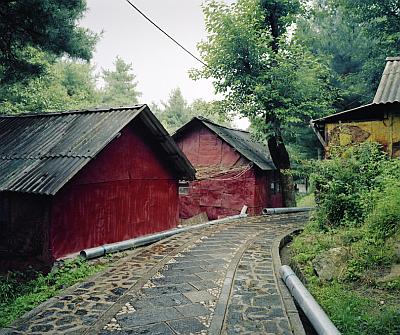
Far Far East
Carlos Lobo
_______________________
"Walking across the city. In the gaps left open by the masses of cars there are still a few isolated individuals, ashen pale or flushed, in incompatible states, and these people have subjected themselves to politics or world history, and amid the technological din they go around posing (like the figures shown in architectural drawings) at the foot of gigantic buildings, which are the essential while they are mere incidentals; moving through this catastrophe as through an underground hangar, I try to breathe everything in through my eyes, to preserve within me the forlorness of these people."
-
Peter Handke, The Weight of the World, translated by Ralph Manheim
_______________________
Medea and Her War Machines
Ioan Flora
translated from the Romanian by Adam J Sorkin with Alina Cåråc
Archipelago
from
About Raising the Waters to the Heights
Once again, as if nailed to this oak bench, I sit at the oak table
in the kitchen garden, pensively watching
the neat rows of tomatoes, garlic, cabbage,
the dill that has no intention of growing
under my eye greedy for the real.
As I have said, at the low table I leaf through random chapters of
the massive document where the author explains,
in the most minute detail,
how a truly enlightened Battle Commander can subdue
a walled city, however proud, defiant, hostile:
“Without the water of the river that courses through the city, the mills are doomed,
and along with them, the tanners’ trade as well as the wool and dye shops;
soon the city’s populace must decide to yield to the greater power
and be grateful with obedience.”
(....)
I sit on this oak bench, at the oak table
in the kitchen garden:
crickets, horseflies, the rains soon to come, the forest
(not the hill) set in motion,
the Doberman Le Duc gnawing the afternoon away on a sheep’s shank-bone,
Paul and Doina who are supposed to arrive any moment,
the apple tree in full bloom,
the Sauvignon in my torpid glance, frosted with mist,
a sparkle in the dusk.
...(more)
Archipelago
1997-2007
_______________________
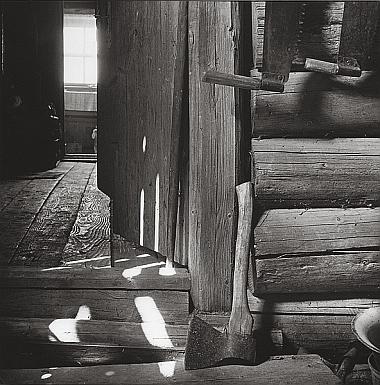
On The Ground
Galina Lukyanova
_______________________
Art and politics: A reappraisal
Victor Burgin
eurozine
What you seem to have disliked most in Modernist discourse was the belief its adherents seemed to express in "the ineffable purity of the visual language" – a conviction that you trace back to a Platonic tradition of thought in which images have the capacity to reveal mystic truths enshrined in things "in a flash, without the need for words and arguments". I wonder if you can say today, some 30 years later, how exactly you feel that words in your work have come to counteract such illusions of pure visibility of the image?
Victor Burgin: I do not believe, or rather no longer believe, that my work can "counteract" such illusions. At the time of Thinking Photography I thought that a more broadly informed photographic criticism would eventually dispel the unexamined assumptions that then dominated writing and talking about photography. The notion of the "purely visual" was prominent amongst these, as was the naïve realist idea that photography is a transparent "window on the world". The former belief dominated "fine art" photography at that time, while the latter provided the ideological underpinning of "social documentary". When I first started to teach film and photography students, after having first taught in an art school, the "art" and "documentary" approaches were mutually antagonistic – ironical, given the fact that their founding assumptions are different formulations of the same Platonic idea. The Film and Photography department where I went to teach in 1973 (the London Polytechnic – ed.) was at the time one of only two schools in the UK openly dedicated to a documentary project and hostile to "fine art" photography. The BA theory course I was asked to construct there, of which Thinking Photography is a trace, did for a while succeed in putting critical discussion – the "reflective stance" you refer to – in place of the acting out of inherited ideologies. But that period is now, as a friend of mine put it, a "parenthesis in history". There has since been a massive return of "previous" frames of mind that had never in fact gone away, even among some of those who participated in the initial project – as if the mere fact of having acknowledged the validity of the arguments advanced in the 1970s and 1980s now provides exemption from acting in response to them. In retrospect I can see – which should not surprise me given my theoretical inclinations – that reason rarely prevails where there are professional and emotional benefits to be derived from irrationality. We are again confronted, as so often, with the psychological structure of disavowal: "I know very well, but nevertheless..."....(more)
Thinking Photography
Edited by Victor Burgin 1982 mediafire pdf
_______________________
Under Pressure
Pictures, Subjects, and the New Spirit of Captialism
Daniel Birnbaum, Isabelle Graw (eds.)
Contributions by Luc Boltanski, Sabeth Buchmann, Tim Griffin, W. J. T. Mitchell, Sighard Neckel, Martin Saar, Paolo Virno
2008
ifile pdf - via aaaaarg
_______________________
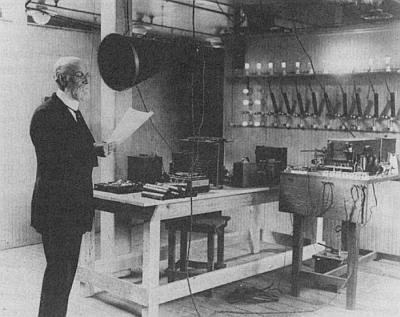
The first radio lecture
Tufts University, 1922
Sending and receiving
Dieter Daniels
translated by Henning Grentz
tout-fait
Is it coincidence that during the last years of the 19th century two disciplines that — due to their lack of physical substance — the ordinary mind found unimaginable are investigated almost synchronous: wireless transmission technology and psychoanalysis? Both of these are the last great gifts of the 19th to the 20th century where they would have enormous effects. Both have lead to a new form of non-dialogic one-way speech that clearly assigns the sender and the receiver their respective separate sides of couch and microphone. And both turn the flow of natural language into a new form of "automatic" speech. The surrealists utilized this phenomenon in their "écriture automatique", which, in turn, is based on the futurist's "wireless imagination", a language lacking any regard to syntax and punctuation. The difference between the approaches of the surrealists and the futurists is that the latter refer to the electric, wireless medium while the former employ the psychological or even para-psychological meaning of "medium" as a model. In the libidinous and immaterial wireless connection between the bachelors and the bride of the Large Glass technology and psychology are put to work together. ...(more)
_______________________
Digital Text Cycles: From Medieval Manuscripts to Modern Markup
Terje Hillesund
Journal of Digital Information, Vol 6, No 1 (2005)
_______________________
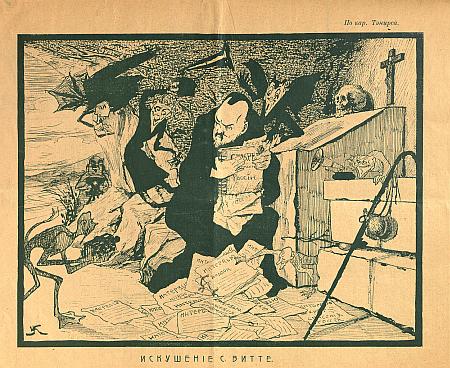
'Dikar'
Ya. D. Sinitsyn, Editor
Sankt-Peterburg: Sinitsyn, Ya. D., 1906
Russian Satirical Journals
bibliodyssey
Russian Satirical Journals
The University of Wisconsin Digital Collections
Wit Larded with Malice
Or: The Satirical Russian Magazines of 1905-08
the nonist
_______________________

photo - mw
The Far Field
Theodore Roethke
d. August 1, 1963
(....)
I learned not to fear infinity,
The far field, the windy cliffs of forever,
The dying of time in the white light of tomorrow,
The wheel turning away from itself,
The sprawl of the wave,
The on-coming water.
(....)
The lost self changes,
Turning toward the sea,
A sea-shape turning around, --
An old man with his feet before the fire,
In robes of green, in garments of adieu.
A man faced with his own immensity
Wakes all the waves, all their loose wandering fire.
The murmur of the absolute, the why
Of being born falls on his naked ears.
His spirit moves like monumental wind
That gentles on a sunny blue plateau.
He is the end of things, the final man.
All finite things reveal infinitude:
The mountain with its singular bright shade
Like the blue shine on freshly frozen snow,
The after-light upon ice-burdened pines;
Odor of basswood on a mountain-slope,
A scent beloved of bees;
Silence of water above a sunken tree :
The pure serene of memory in one man, --
A ripple widening from a single stone
Winding around the waters of the world.
...(more)
_______________________
Poets and Artists (Fall 2010)
edited by Didi Menendez
_______________________
Everything You Need to Know About Global Warming in 5 Minutes
Jeremy Grantham

entropic kingdom
Tom Chambers
via Marcar Foto
_______________________
Fragments: Jean Baudrillard
Conversations with François L'Yvonnet
mediafire pdf - via aaaaarg
My first relationship to language was much more visceral or poetic than conceptual .
And in a way you're coming back to that.
You could certainly say I 've come to a point where I want, for example, to take up again the translation I made of Holderlin, and to take up Nietzsche again too, and even pataphysics , which re-emerges in a certain context of analysis, at the end of a theorization of integral reality, of the realization of the world through all our techniques and systems. Once achieved, this integral reality is the Ubuesque accomplishment par excellence! Pataphysics might be said to be the only response to this phenomenon, both in its total confusion - it's neither critical nor transcendent, it's the perfect tautology of this integral reality, it's the science of sciences - and at the same time it's the monstrousness of it too. Pataphysics is both a science of imaginary solutions and a myth of imaginary solutions . It's the imaginary solution to the kind of final solution that the current state of affairs might be said to constitute.
If there is a return to pataphysics, it's not in terms of argument or solutions, but a return that is itself imaginary, a kind of singular horizon. But I don't have any inclination to argue about this; it would be entirely paradoxical, since there's no reason to lend any philosophical or metaphysical status to the adventure! Pataphysics remains a game, and at the same time a violent ferment. I had the opportunity to say what I thought about it in a piece I wrote on Artaud and pataphysics in a poetico-metaphorical style. I was about twenty at the time and I was torn between the two. I contrasted the theatre of Cruelty, of bloody, savage, raw Cruelty, with pataphysics , which is exactly the opposite. For pataphysics there is no primal scene. There is nothing in a raw, cruel state. Everything is already a virtual phantasmagoria....
Ultimately, for me, pataphysics was a kind of esoteric parenthesis. But, in the end , considering this integral reality, this kind of integrism of reality - of the real and the rational - we find ourselves unwittingly in an entirely pataphysical situation!
Ubuesque in spite of itself!
But we must avoid any conflation here, and preserve the fantastical aura of pataphysics, keep it as a radical external hypothesis. It remains precious for describing this full, overfull world, saturated like King Ubu, who's the image of overblown, selfsatisfied cruelty - which corresponds rather well to our current environment !
_______________________
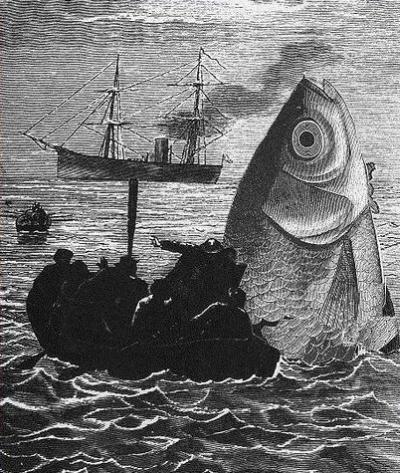
Une Semaine De Bonté (A Week of Kindness)
or, the Seven Deadly Elements
Max Ernst
1934
music of Krzysztof Penderecki
youtube
more from George M. Wallace
a fool in the forest
_______________________
By the Waters of Babylon
Rosmarie Waldrop
sibila
1
We take language for granted, as we do sitting and weeping. Unfamiliar speech we take for inarticulate gurgling. Filtered through sandbags.
A searchlight beam makes a statement.
The order of the world is so foreign to our subjective interests that we cannot imagine what it is like, says William James. We have to break it. Into histories, art, sciences, or just plain rubble. Then we feel at home.
I could list the parts of the body as in a blason. And how they can get hurt.
2
Unless we recognize a language we do not recognize a man. We wrap entire villages in barbed wire.
My father used to close his eyes and remain as motionless as possible to let his body-image dissolve.
I repeat myself often.
Time has no power over the Id. But heat passes from a warm body to a cold body and not in the reverse direction.
...(more)
via the page
_______________________
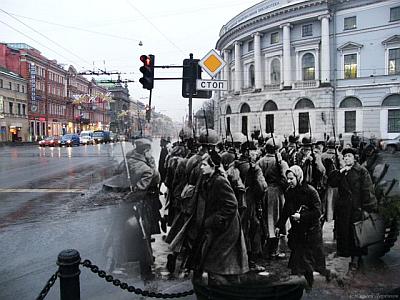
Sergey Larenkov
via Bryan Alexander
_______________________
Eight Years Of Languagehat
8 posts reprised.
_______________________
otoliths 18
issue eighteen
southern winter, 2010
Editor: Mark Young
poems from the last book A Marzipan Factory + two paintings in the last issue of Otoliths (#18), online:
http://the-otolith.blogspot.com/2010/06/grzegorz-wroblewski.html
With best wishes - Grzegorz Wróblewski.
Two Paintings & Four Poems
Grzegorz Wróblewski
Mice
Grzegorz Wróblewski
translated by Adam Zdrodowski
We know them only through descriptions in books.
They have to be small, fluffy and quite cunning? Or maybe you mean
midsummer night?
An old cat is also indispensable. (All the people you could trust have been
eradicated.)
Experienced enough not to be afraid of fireworks in Iraq?
You suggest making love in the fresh air. And let there even be
predatory leeches.
‘Cause we’ve come too much unstuck from the skin.
It seems to us that the sun was installed yesterday by Mcorso,
the stiff from the ground floor, the scenography guy.
_______________________
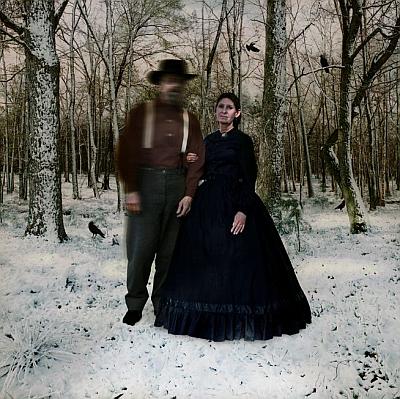
war widow
rite of passage
Tom Chambers
_______________________
Maximus to Gloucester, Letter 27 [withheld]
Charles Olson
I come back to the geography of it,
the land falling off to the left
where my father shot his scabby golf
and the rest of us played baseball
into the summer darkness until no flies
could be seen and we came home
to our various piazzas where the women
buzzed
To the left the land fell to the city,
to the right, it fell to the sea
(....)
This, is no bare incoming
of novel abstract form, this
is no welter or the forms
of those events, this,
Greeks, is the stopping
of the battle
It is the imposing
of all those antecedent predecessions, the precessions
of me, the generation of those facts
which are my words, it is coming
from all that I no longer am, yet am,
the slow westward motion of
more than I am
There is no strict personal order
for my inheritance.
...(more)
back to geography (PoemTalk #34)
Bob Perelman, Rachel Blau DuPlessis and Charles Bernstein
a podcast series sponsored by
the Poetry Foundation | the Kelly Writers House | & PennSound
|
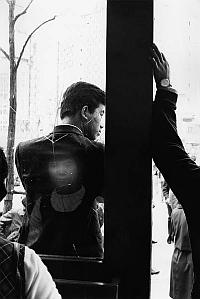


 Janus Head
Janus Head

 The Age of Briggs & Stratton
The Age of Briggs & Stratton












































